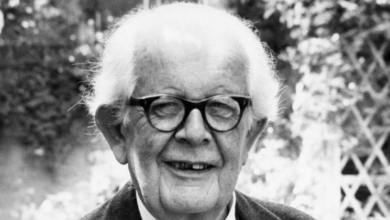- Erik Erikson's theory explains how social and cultural factors influence our growth and change throughout life, emphasizing that development continues beyond childhood.
- Erikson outlined eight stages, each presenting a unique challenge, from "Trust vs. Mistrust" in infancy to "Integrity vs. Despair" in old age, with successful resolution aiding future stages.
- Erikson believed our main life challenge is figuring out who we are, influenced by our social connections and experiences, leading to a strong sense of identity.
- Unlike Freud, who focused on biological drives and ended his theory at adolescence, Erikson emphasized social influences and lifelong development.
- Despite critiques about overlap with Freud, conceptual vagueness, and cultural bias, Erikson's theory remains valuable for understanding issues like trust, autonomy, and societal contributions.
Erik Erikson was a famous psychologist who came up with a theory about how people grow and change throughout their lives. He believed that social and cultural factors play a huge role in shaping us and that development doesn’t stop after childhood—it continues throughout our entire life.
What is Psychosocial Development?
The term “psychosocial” combines “psychological” and “social,” highlighting how our sense of identity and our social connections influence our behavior. Erikson’s theory is made up of several stages, each with a specific challenge or task to overcome.
Erikson explored personal life and relationships, drawing from his own experiences and struggles. He believed that everyone has basic needs that shape their growth, influenced by the support they get from their environment, especially from parents and caregivers. Each stage in his theory presents a challenge that offers a chance for growth. Solving these challenges successfully at each stage helps with the next one.
Key Ideas from Erikson
Positive and Negative Resolutions
Erikson stressed the importance of resolving each stage’s challenge positively, though he knew it wasn’t always possible. For instance, learning to trust is good, but we shouldn’t trust everyone. If someone doesn’t resolve a challenge well, they might revisit it later to work on it again.
How Erikson’s Theory is Different from Freud’s
- Social and Cultural Factors: Unlike Freud, who focused on biological and sexual drives, Erikson emphasized the impact of social and cultural influences on development.
- Lifespan Perspective: Freud’s theory ended at adolescence, but Erikson believed that development continues throughout life, with each stage presenting new challenges and growth opportunities.
The Quest for Identity
Erikson’s theory revolves around the idea that our main life challenge is figuring out who we are. At different stages, we ask ourselves, “Who am I?” and come up with different answers. Each stage is linked to a key task or crisis that needs resolution to help us develop a strong sense of identity.
The Eight Psychosocial Stages
- Trust vs. Mistrust (Birth to 1 year): Babies learn to trust when caregivers provide consistent, loving care. If care is unpredictable, they develop mistrust.
- Autonomy vs. Shame (1–3 years): Toddlers strive for independence. Encouraging them helps build autonomy, while too much criticism leads to shame and doubt.
- Initiative vs. Guilt (3–6 years): Preschoolers take initiative by exploring and planning. Support fosters a sense of purpose, while harsh criticism can cause guilt.
- Industry vs. Inferiority (6–12 years): School-aged kids develop competence through accomplishments. Failure can lead to feelings of inferiority.
- Identity vs. Confusion (12–18 years): Teens explore different roles to develop a strong identity. Lack of support can result in confusion about who they are.
- Intimacy vs. Isolation (Young adulthood): Young adults form close relationships. Without a secure sense of identity, they may feel isolated.
- Generativity vs. Stagnation (Adulthood): Adults contribute to society and care for the next generation. Without this, they may feel stagnant and unproductive.
- Integrity vs. Despair (Old age): In later life, reflecting on life with a sense of fulfillment leads to integrity, while regret can result in despair.
Critiques of Erikson’s Theory
Erikson’s theory has faced some criticism:
- Overlap with Freud: Some argue Erikson’s stages align too closely with Freud’s, which may be too restrictive.
- Conceptual Vagueness: Erikson’s ideas can be hard to measure and test.
- Timing of Identity and Intimacy: Not everyone fits the exact timelines Erikson suggested for identity and intimacy development.
- Cultural Influence: Erikson didn’t fully account for how different cultures affect development.
- Empirical Evidence: More research is needed to support all parts of his theory.
Despite these critiques, Erikson’s ideas are still valuable for understanding how people grow and develop. His theory provides insights into why some people have issues with trust, autonomy, or work ethic, and why others are committed to making the world better. Erikson’s work helps explain many behaviors we see in everyday life.

